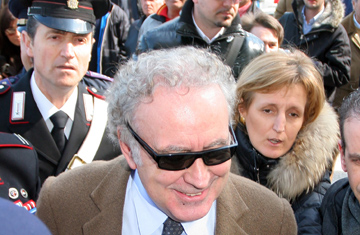
Italian TV host and journalist Michele Santoro
The last time Michele Santoro was forced off the airwaves, the Italian television presenter had to fight for four years before he was able to broadcast again. This time, thanks to the Internet, it's taken him less than a month.
In 2002, the left-wing commentator's show was canceled after Prime Minister Silvio Berlusconi accused him and two other presenters of making "criminal use" of RAI, the biggest public television network in Italy. Santoro waged a long court battle against the broadcaster and prevailed, going back on the air in 2006. Earlier this month, however, RAI suspended all of its political talk programming until regional elections are held on March 28, citing a need to maintain its political balance. This time, Santoro decided that his show, Annozero, would go on. He filmed a live version of his program Thursday that was streamed online and broadcast through local and satellite television feeds. "For us, the most important thing is that people watch," says Santoro.
That Italians were able to do so is a testament to the country's changing media landscape, in which social-networking websites have emerged as an alternative to an information industry long tied to the government, political parties and industrialists. To pay for his production, Santoro put the word out through Facebook and other social media sites, recruiting 50,000 people who paid €2.50 ($3.33) apiece. Corporate sponsors provided the Internet and satellite feeds. "The last time Santoro was off the air he was basically unplugged," says Bernhard Warner, director of Custom Communications, a London-based social media consultancy. "Now what his supporters are able to do using social media is start a movement and get his voice out."
Santoro is hardly an outsider in an industry where press and politics often walk hand in hand. He first started working at RAI in 1982, and when his show went off the air, he served briefly as a European Parliament member, representing Italy's center-left political coalition. But supporters are hoping his efforts will be the first chink in what has been a tightly controlled media market. "It's still early days," says journalist Marco Travaglio, a regular guest on the show. "But we're going to try. If it works, it could set a precedent."
It's not that Italians don't enjoy freedom of expression. The problem is that until recently there haven't been many outlets where they could effectively exercise it. Newspapers are generally tied to political parties or industrial concerns, resulting in a press that seems less written for the general public than for politicians and other insiders. But most striking is Berlusconi's domination of the airwaves. In a country where 80% of people get their news from television, he owns the three biggest commercial stations and maintains influence over the three public channels (RAI among them), whose governing boards are appointed by the state. Last week, Italian newspapers published transcripts of wiretaps in which Berlusconi could apparently be heard berating Giancarlo Innocenzi, the head of the independent broadcast regulator, to shut down Annozero. During a November broadcast dealing with alleged mafia ties in Berlusconi's government, the Prime Minister allegedly phoned Innocenzi and exclaimed: "It's obscene. You need to make a concerted effort to push RAI to say, 'Enough. We're shutting everything down,'" according to the transcripts. Berlusconi, who has been placed under investigation by Italian magistrates, calls the accusations that he tried to block the program "ridiculous and grotesque." Innocenzi, too, has denied that he was pressured to shut down Annozero.
But another recent episode has become emblematic of both Berlusconi's grip on the press and the potential for new media to undermine his control. On Feb. 25, an Italian court dismissed the case against a lawyer who had been found guilty of taking bribes from Berlusconi. The court made no ruling on the evidence — it simply closed the case because the 10-year statute of limitations had expired. But when RAI's flagship channel reported the news during its lunchtime broadcast, the presenter announced that the lawyer had been "acquitted" of the charges. Until recently, the comment would have gone unchallenged. This time, however, the clip went viral on Facebook. A group set up to protest the broadcast quickly grew to nearly 200,000 members, most of whose names were printed out and delivered to RAI's offices in a suitcase. "Our way to organize, to make our voice heard, to be clear that we are so many, has become the Internet," says Arianna Ciccone, the founder and director of the Perugia International Journalism Festival. (RAI's producers have since said the presenter's comment was a mistake.)
Yet, the best measure of how the Internet is shaking up the media landscape may be the establishment's response, which has thus far been harsh. Both left- and right-leaning governments have floated legislation in recent years intended to rein in online expression. In addition, an Italian court recently held three Google executives responsible for a video posted to YouTube that showed teenagers bullying an autistic classmate, sentencing each to a suspended six-month jail term. "The development of technology makes it more difficult for those who spend their days hiding the news," says Travaglio. "Every time they try to mark the cards, they'll know that somebody is watching and what they're trying to hide will be put online."
